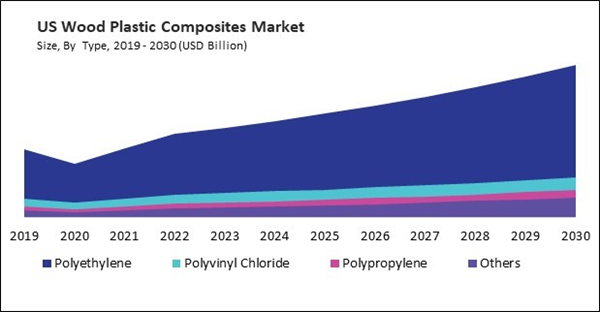The automotive industry represents a growing market for wood plastic composites (WPC) as manufacturers seek lightweight, durable, and sustainable materials for interior and exterior automotive components. WPCs offer advantages such as reduced weight compared to traditional materials like metal or fiberglass, contributing to improved fuel efficiency and lower emissions in vehicles. These composites can be moulded into various shapes and textures, making them suitable for applications such as door panels, dashboards, trunk liners, and interior trim pieces. Therefore, the automotive industry consumed overall 161.6 kilo tonnes in US market in 2022.
The US market dominated the North America Wood Plastic Composites Market, by Country in 2022, and would continue to be a dominant market till 2030; thereby, achieving a market value of $3,238.2 Million by 2030. The Canada market is experiencing a CAGR of 11.4% during (2023 - 2030). Additionally, The Mexico market would exhibit a CAGR of 10.4% during (2023 - 2030).
Advanced antioxidants scavenge free radicals and reactive oxygen species generated during processing, storage, and exposure to heat, moisture, and oxygen, preventing chain scission, cross-linking, and degradation of polymer chains. By maintaining polymer stability and mechanical properties, antioxidants enhance WPCs' thermal stability, weatherability, and long-term performance, reducing the risk of degradation and deterioration in demanding environmental conditions.
In addition, composite processing technologies play a crucial role in optimizing material properties, manufacturing efficiency, and product quality. Innovations in extrusion, injection molding, compression molding, and co-extrusion techniques enable precise control over material distribution, fiber orientation, and surface finish, facilitating the production of complex shapes, profiles, and textures in WPC products. Likewise, the integration of functional additives and smart materials into WPC formulations expands the range of applications and functionalities of WPCs.
Canada is committed to advancing sustainability and green building practices to mitigate environmental impact and address climate change. WPCs from recycled wood fibers and plastic polymers align with these sustainability goals, offering a renewable and low-carbon alternative to traditional materials like wood, concrete, and metals. As per the data from the Statistics Canada, investment in building construction rose 1.7% to $19.8 billion in November 2023. The residential sector grew 2.2% to $13.7 billion, while non-residential sector investment increased 0.4% to $6.0 billion. Hence, North America's growing automotive and construction sectors will increase demand for WPC.
Based on Type, the market is segmented into Polyethylene, Polyvinyl Chloride, Polypropylene and Others. Based on Application, the market is segmented into Building & Construction, Automotive Components, Industrial & Consumer Products and Others. Based on countries, the market is segmented into U.S., Mexico, Canada, and Rest of North America.
List of Key Companies Profiled
- Trex Company, Inc.
- The AZEK Company Inc. (TimberTech)
- Fortune Brands Innovations, Inc.
- Dow, Inc.
- UFP Industries, Inc.
- Renolit SE
- AIMPLAS
- JELU-WERK J. Ehrler GmbH & Co. KG
- FKuR Kunststoff GmbH
- Beologic
Market Report Segmentation
By Type (Volume, kilo Tonnes, USD Billion, 2019-2030)- Polyethylene
- Polyvinyl Chloride
- Polypropylene
- Others
- Building & Construction
- Automotive Components
- Industrial & Consumer Products
- Others
- US
- Canada
- Mexico
- Rest of North America
Table of Contents
Companies Mentioned
- Trex Company, Inc.
- The AZEK Company Inc. (TimberTech)
- Fortune Brands Innovations, Inc.
- Dow, Inc.
- UFP Industries, Inc.
- Renolit SE
- AIMPLAS
- JELU-WERK J. Ehrler GmbH & Co. KG
- FKuR Kunststoff GmbH
- Beologic









